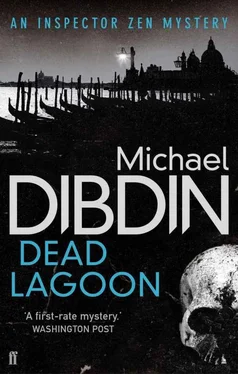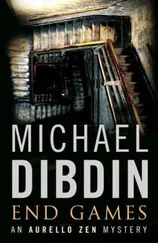Michael Dibdin - Dead Lagoon
Здесь есть возможность читать онлайн «Michael Dibdin - Dead Lagoon» весь текст электронной книги совершенно бесплатно (целиком полную версию без сокращений). В некоторых случаях можно слушать аудио, скачать через торрент в формате fb2 и присутствует краткое содержание. Жанр: Полицейский детектив, на английском языке. Описание произведения, (предисловие) а так же отзывы посетителей доступны на портале библиотеки ЛибКат.
- Название:Dead Lagoon
- Автор:
- Жанр:
- Год:неизвестен
- ISBN:нет данных
- Рейтинг книги:5 / 5. Голосов: 1
-
Избранное:Добавить в избранное
- Отзывы:
-
Ваша оценка:
- 100
- 1
- 2
- 3
- 4
- 5
Dead Lagoon: краткое содержание, описание и аннотация
Предлагаем к чтению аннотацию, описание, краткое содержание или предисловие (зависит от того, что написал сам автор книги «Dead Lagoon»). Если вы не нашли необходимую информацию о книге — напишите в комментариях, мы постараемся отыскать её.
Dead Lagoon — читать онлайн бесплатно полную книгу (весь текст) целиком
Ниже представлен текст книги, разбитый по страницам. Система сохранения места последней прочитанной страницы, позволяет с удобством читать онлайн бесплатно книгу «Dead Lagoon», без необходимости каждый раз заново искать на чём Вы остановились. Поставьте закладку, и сможете в любой момент перейти на страницу, на которой закончили чтение.
Интервал:
Закладка:
Emptied of its furnishings, the room looked spacious and serene, yet how much smaller than he remembered it! Whenever he had returned in his imagination — even a moment before, dithering on the landing — it had seemed a cavernous, epic space. He almost laughed, now, to see how insignificant it really was. But he did not laugh, for something in him died at that moment, and he knew that he had lost another and perhaps the most important of the few remaining threads which bound him to his childhood.
In the kitchen, a note had been left on the draining-board: Dear Aurelio, I’ve done the best I can, the old place looks a bit shabby, what can you expect, at least it’s clean and I’ve made the bed in your old room, we’ll expect you for lunch, it’ll be like the old days! Rosalba. The man laid down the scrap of lined paper gently, as though it might break, and returned to the living room, where he set about opening windows, unbolting the heavy wooden shutters, pressing them back to lie flat against the wall and folding down the metal clips which held them in place. The cold night air flowed into the room, scouring out the lingering odours of absence and neglect. Leaving the windows open, the man returned to the door, picked up his suitcase and went upstairs.
On this floor, more of the original furniture remained, making the low-ceilinged bedroom feel cramped and stuffy. The mirror-fronted wardrobe which stretched the length of one wall created an illusory sense of spaciousness belied by the stale, confined air. The man laid his suitcase down on the bed and turned to survey himself in the wall of mirrors. His double looked back at him with a drawn, wary look and the air of someone stranded against his will in a remote and inhospitable hotel. Nothing suggested that of all rooms in the world this was the most familiar to him.
He opened this window too, breathing in the crisp, salty air. In the canal below, the murky water shifted and stirred. All else was still. The city might have been deserted. To someone accustomed to life in Rome, where the reverberant hum of traffic on the hollow tufo is a constant presence, night and day, such absolute, unqualified silence was troubling, as though some vital life function had ceased. The man turned back into the room, sat down on the bed and took his shoes off. Then, overcome by weariness, he lay down and closed his eyes against the sickly yellow light emitted by the lamp, a complex extravanganza of tinted Murano glass, all curlicues and convolutions…
A splashing roused him. He felt chilled to the bone, stiff, exhausted, confused. It took him a long time to realize where he was, and when he did the news was comfortless. It had all been a terrible mistake. He should never have come.
The noise which had awakened him was still there, steady, regular, reverberating in the confined space between the houses. He got up off the bed, swung his bare feet down to the chilly tiles the colour and sheen of parmesan and padded over to the window. There was still no sign of the dawn. The man glanced at his watch. It was just after five.
Further down the canal, by the bridge, a streetlamp partly illuminated a segment of the water. There was something moving there, a boat of some kind. As the man watched, it entered the patch of lighted water and was revealed in silhouette: a small dinghy being paddled by two bulky, shapeless figures. The craft rounded the corner and disappeared. Silence fell once more. Rubbing his eyes, Aurelio Zen closed the window and went back to bed.
When he awoke again the room was filled with an astringent brilliance which made him blink, an abrasive slapping of wavelets and the edgy scent which had surprised him the moment he stepped out of the train. He had forgotten even the most obvious things about the place, like the pervasive risky odour of the sea.
Since his mother had come to live with him in Rome, Zen had returned only rarely to his native city, brief fleeting visits to ensure that the house was still standing, or to wrestle some necessary piece of paper away from the commune. He had deliberately avoided examining the reasons for this voluntary exile too closely, pretending to himself and others that it was due to the demands of his career. There was something in that, but he sensed that there was much else besides; painful, murky matters which he kept filed away in an inaccessible portion of his mind under the vague heading ‘Personal’.
Now, though, it was all gradually returning to him. The urgent plashing he could hear below, he realized, was the final ripples of wash from a vessel passing down the nearby Cannaregio canal. Last night there had been no such traffic, which is why the similar sound he had heard then had drawn him instinctively to the window. He recalled the dinghy, the muffled figures. The more he thought about the incident, the odder it seemed. What could anyone have been doing rowing around the back canals of the city at such an hour? Perhaps he had never woken at all. Perhaps it had all been a dream. No other solution seemed to make sense.
Outside, a skittish wind frisked about the courtyard, glancing off the stone walls, pouncing out from narrow alleys. The sun, barely veiled by haze, set up blocks of shadow seemingly more solid than the surfaces from which all substance had been leached by its slanting, diffuse light. Aurelio Zen slammed the front door behind him and set off towards the cafe on the quay of the Cannaregio. Rosalba had done wonders in getting the house habitable, but the cupboards and larder were bare. He should have remembered to bring a pack of coffee, at least.
When he reached the corner, his first thought was that he must have lost his bearings. Not only was there no sign of the cafe, but the barber’s and ironmonger’s next door had also vanished. Zen looked around him distractedly. Yes, there was the palazzo on the other side of the canal, and there the church. This was the corner, no doubt about it, but all that was to be seen was a stretch of grimy glass covered in faded posters protesting against the forcible evictions of sitting tenants. A workshop for carnival masks had taken over the shops next door.
A gaunt grizzled man came shuffling along the alley. He wore an ancient suit, a grubby pullover and tartan carpet slippers. Some distance behind him, a mangy dog trailed along dispiritedly at the end of a length of filthy rope.
‘Excuse me!’ Zen called. ‘Do you know what’s happened to Claudio’s bar?’
The man’s eyes widened in fright.
‘Is it you, Anzolo? I never thought to see you again.’
Zen stared more closely at him.
‘Daniele?’ he breathed. ‘I’m Aurelio. Angelo’s son.’
The old man squinted back at him. His crumpled face was unshaven. A mass of red veins covered his nose. Three lone teeth remained in his bottom gum, sticking up like the money tabs in the huge silver cash register which used to lord it over Claudio’s bar.
‘Aurelio?’ he muttered at last. ‘The little hooligan who used to terrorize the whole neighbourhood and make his mother’s life a misery? I can still hear her words. “For the love of God, Daniele, give him a damn good thrashing! I can’t control him any more. At this age, it takes a man to keep them in line.”’
He tugged his dog viciously away from a niffy patch of plaster it was investigating.
‘How is Giustiniana, anyway?’
‘My mother’s fine, Daniele.’
‘And what are you doing here?’
‘I’m on business.’
‘What sort of business?’
‘I’m in the police.’
Daniele Trevisan drew back.
‘The police?’
‘What about it?’
‘Nothing. It’s just the way you were going…’
‘Yes?’ demanded Zen.
‘Well, to be frank, I’d have expected you to end up on the other side of the law, if anything.’
Читать дальшеИнтервал:
Закладка:
Похожие книги на «Dead Lagoon»
Представляем Вашему вниманию похожие книги на «Dead Lagoon» списком для выбора. Мы отобрали схожую по названию и смыслу литературу в надежде предоставить читателям больше вариантов отыскать новые, интересные, ещё непрочитанные произведения.
Обсуждение, отзывы о книге «Dead Lagoon» и просто собственные мнения читателей. Оставьте ваши комментарии, напишите, что Вы думаете о произведении, его смысле или главных героях. Укажите что конкретно понравилось, а что нет, и почему Вы так считаете.











